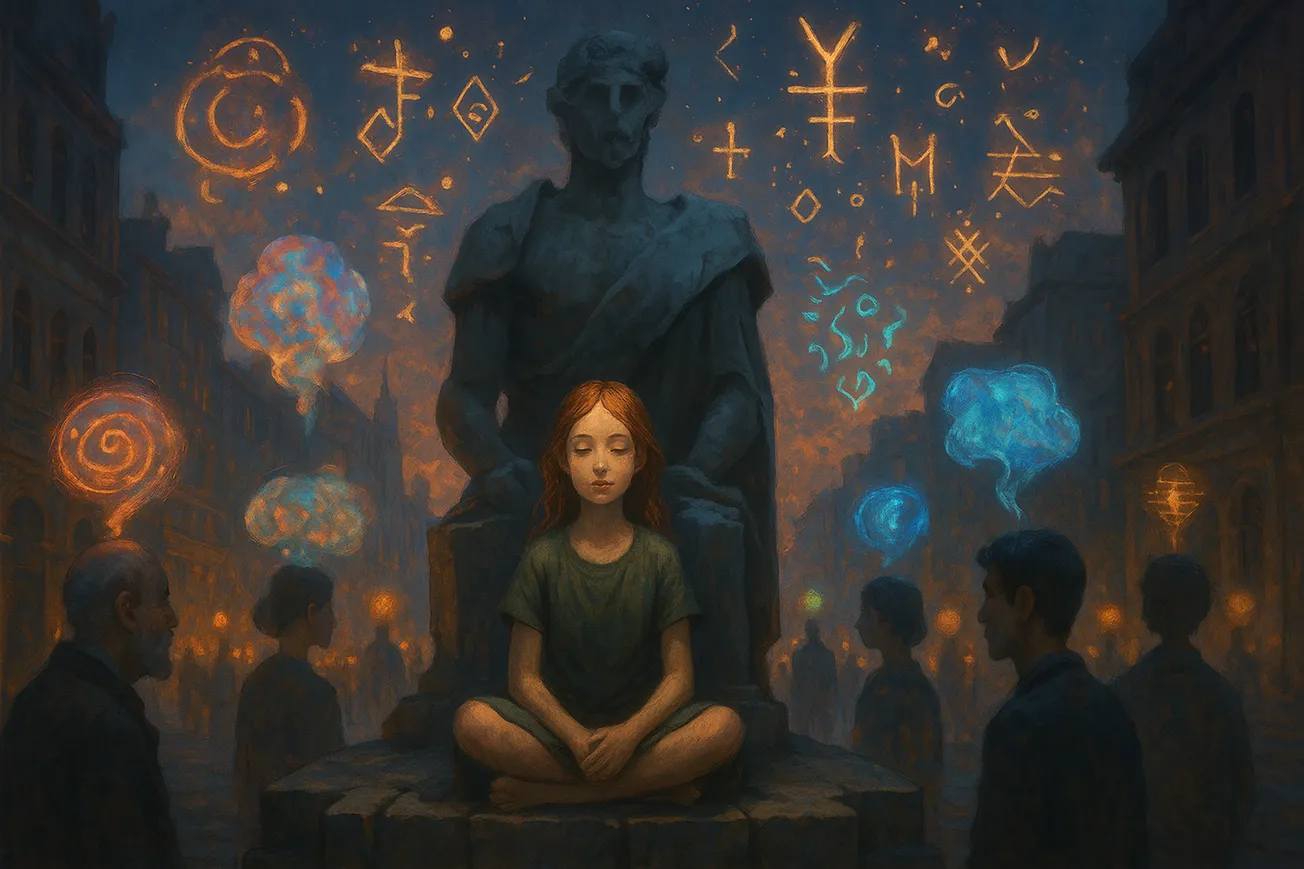🌈 The Fractal Story Engine | Meta-Meaning, Knowledge, Language | (6) MMK-001-F1
In the city of Tembra, there were no secrets. Not because the people were honest, but because every thought hummed into the air like heat from stone. Thoughts floated up from skulls in faint colors, shaped like birds or blades or riddles. No one could control it. No one could stop it. A child’s envy shimmered yellow and sharp behind her eyes. A merchant’s lust flickered blue and oily above his head. Grief hung heavy and red, pooling around the feet like smoke.
People walked carefully in Tembra. You had to. There were no lies, but there were still masks. Not the kind worn on the face. Children were taught young how to think softly, how to weave decoys, how to hide a memory inside another. But nothing was ever truly private. Every thought, if strong enough, would eventually bloom into the air.
Doors in Tembra had no locks. You couldn’t rob someone who saw what you were planning. You couldn’t cheat without your treachery forming shapes in the hallway. You couldn’t murder in secret. The blade would glow in your mind long before it touched flesh.
No one killed in Tembra. At least not often.
There was a girl named Ellar who had no color at all. She was born in the northern quarter, where the sky always smelled like burned copper. Her thoughts made no shapes. No whispers. No pulse. They simply stayed inside her. It frightened the teachers. It disturbed the neighbors.
When she was young, they accused her of cruelty for no reason other than her opacity. “She must be hiding something,” they said. “Nothing good lives in a quiet skull.”
They were not wrong, but they were not right either.
Ellar could see others’ thoughts as clearly as anyone else, but hers did not rise. Instead, she learned to mold her mind into mirrors. She could reflect people’s thoughts back at them with terrifying clarity. She could hold a person’s most buried fear like a fruit in her palm and wait for them to see it too.
They called her Hollow. The name stuck.
At fifteen, Ellar left home and walked to the edge of the city, where the statues of the old gods leaned like broken teeth. She carried no pack, no food, just a single question: Where did the thoughts go, if they didn’t rise?
She sat at the foot of a crumbling god and refused to speak for ten days. People passed her, muttering green clouds of pity, suspicion, and hunger. But she remained still. On the eleventh day, something came.
It wasn’t a sound. It wasn’t a vision. It was a presence. The residue of every unspoken thought that had ever been swallowed. All the desires abandoned before they had a name. All the insights dismissed before they reached air. The city was full of them, sunken beneath the chatter of everyday minds. Ellar could feel them, pooling beneath the cobblestones.
She reached into that place. Not with her hands, but with something older.
The next day, she returned to the city.
People noticed something different. Not in her. She still cast no thought-forms. But in themselves. Their own thoughts began to linger. Memories hovered longer than they should. Embarrassment stayed for hours, spinning in the air like a slow, drunk moth. Strangers began to see each other more clearly. Too clearly. People began locking their doors, even though they had no locks.
Then came the forgetting.
Names unraveled. Time collapsed. Whole marriages dissolved after a single glance. The thoughts had grown louder. Not just louder. Heavier. People could no longer pretend. A butcher dropped his cleaver and walked into the hills. A priest began to weep every time she opened her mouth. Children stopped speaking altogether, preferring to trace their thoughts in ash.
Ellar did not speak, but she watched.
The city council summoned her.
They begged her to leave. They offered food, gold, ritual offerings.
She just looked at them, her mind as quiet as glass.
“We will not survive this,” the mayor whispered, his own guilt fluttering violet above his brow.
Ellar turned and walked to the center of Tembra. There, where four roads met and old cobbles showed the names of forgotten kings, she lay on the ground and closed her eyes.
The city waited.
That night, the sky filled with symbols no one had ever seen before. Not thoughts. Not memories. Something older. Deeper. People dropped to their knees. A child began to laugh and couldn’t stop for hours. Somewhere, a blind man saw for the first time and then forgot how.
In the morning, Ellar was gone.
But something stayed.
Now, in Tembra, when a thought rises, it is never alone. It carries echoes. Reflections. Fragments of thoughts that were never yours. People have learned to walk slower, to listen without knowing why.
And some have stopped thinking altogether.
They say the girl was never hollow.
Only too full.

